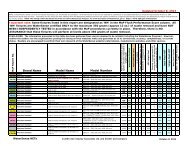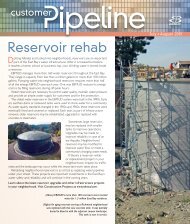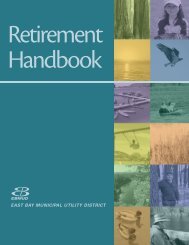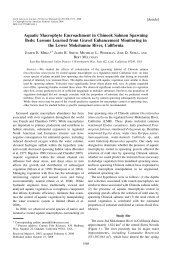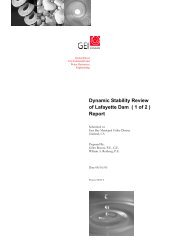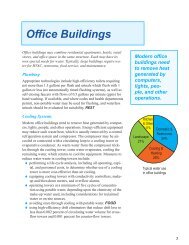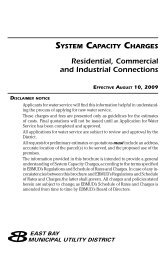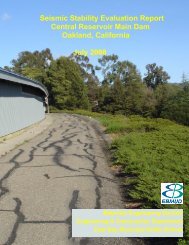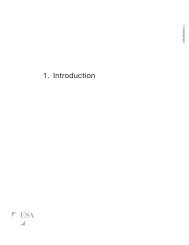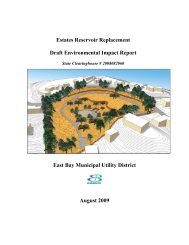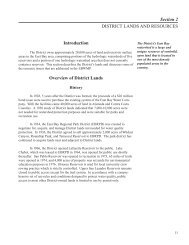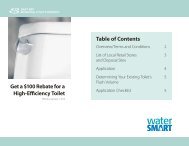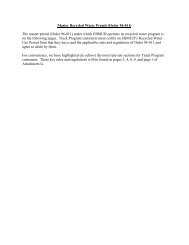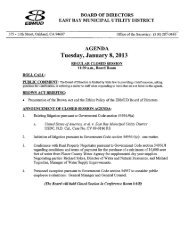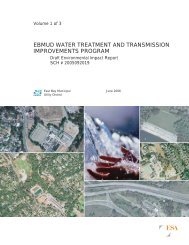ORD311A03 with Table of Contents - East Bay Municipal Utility District
ORD311A03 with Table of Contents - East Bay Municipal Utility District
ORD311A03 with Table of Contents - East Bay Municipal Utility District
You also want an ePaper? Increase the reach of your titles
YUMPU automatically turns print PDFs into web optimized ePapers that Google loves.
TITLE I – GENERALSection 1 - Short TitleThis Ordinance shall be known as the “WASTEWATER CONTROL ORDINANCE”.Section 2 - PurposeSpecial <strong>District</strong> No. 1 <strong>of</strong> the EAST BAY MUNICIPAL UTILITY DISTRICT was formedand exists under the provisions <strong>of</strong> the <strong>Municipal</strong> <strong>Utility</strong> <strong>District</strong> Act (Public Utilities Code <strong>of</strong> theState <strong>of</strong> California, Division 6) for wastewater disposal service <strong>with</strong>in its boundaries. Wastewaterdisposal facilities have been constructed for the interception, treatment, and disposal <strong>of</strong> wastewaterand industrial wastes originating <strong>with</strong>in its boundaries. The purpose <strong>of</strong> this Ordinance is toregulate the interception <strong>of</strong> wastewater and industrial wastes and to control wastewater to providethe maximum public benefit <strong>of</strong> the wastewater disposal facilities <strong>of</strong> the <strong>District</strong>. The regulationsshall include provisions for source control in order to monitor and control quantity, quality, andflow <strong>of</strong> wastewater and industrial waste. The regulations shall require charges for use <strong>of</strong>wastewater disposal facilities <strong>of</strong> the <strong>District</strong> which are designed to achieve an equitable recovery <strong>of</strong>the capital and operating costs <strong>of</strong> such facilities. The regulations shall include provisions forenforcement and penalties for violations.Section 3 - DefinitionsFor the purposes <strong>of</strong> this Ordinance, unless the context specifically indicates otherwise, themeaning <strong>of</strong> terms used shall be as follows:a. "Business Classification Code" (BCC) - A classification <strong>of</strong> dischargers based on the1987 Standard Industrial Classification Manual, Office <strong>of</strong> Management and Budget <strong>of</strong> theUnited States <strong>of</strong> America.b. “Bypass” – The intentional diversion <strong>of</strong> wastestreams from any portion <strong>of</strong> a discharger’streatment facility.c. “Categorical Pretreatment Standards” - Any regulations containing pollutant dischargelimits promulgated by the EPA in accordance <strong>with</strong> Section 307(b) and (c) <strong>of</strong> the Act (33U.S.C. 1317) and which apply to a specific category <strong>of</strong> industrial user and which appear inTitle 40 <strong>of</strong> the Code <strong>of</strong> Federal Regulations (40 CFR) Chapter I, Subchapter N, Parts 405-471.d. “Chemical Oxygen Demand, Filtered” - The amount <strong>of</strong> Chemical Oxygen Demandpassing through a glass filter as measured in conformance <strong>with</strong> the <strong>District</strong>'s approvedmethod. Chemical oxygen demand is the measure <strong>of</strong> the oxygen equivalent <strong>of</strong> the organicmatter <strong>of</strong> a sample that is susceptible to oxidation by a strong chemical oxidant.e. “Community Sewer System” - The sewers owned and operated by public agencies<strong>with</strong>in the boundaries <strong>of</strong> the <strong>District</strong> which are connected to an interceptor <strong>of</strong> the <strong>District</strong>.2
A “community sewer” is that portion <strong>of</strong> a community sewer system which receiveswastewater from the side sewer <strong>of</strong> a discharger.f. “Contamination” - An impairment <strong>of</strong> the quality <strong>of</strong> the waters <strong>of</strong> the State by waste to adegree which creates a hazard to the public health through poisoning or through the spread<strong>of</strong> disease. Contamination shall include any equivalent effect resulting from the disposal <strong>of</strong>wastewater, whether or not waters <strong>of</strong> the state are affected.g. “Critical Industry” - A discharger whose wastewater requires special regulations orcontains industrial wastes requiring source control or whose average wastewater strengthcannot be established on a business classification basis.h. “Director” – Director <strong>of</strong> the Wastewater Department <strong>of</strong> the <strong>East</strong> <strong>Bay</strong> <strong>Municipal</strong> <strong>Utility</strong><strong>District</strong>, or his designated representative.i. “Discharger” - Any person who discharges or causes the discharge <strong>of</strong> wastewater to acommunity sewer system.j. "<strong>District</strong>" - Special <strong>District</strong> No. 1 <strong>of</strong> the <strong>East</strong> <strong>Bay</strong> <strong>Municipal</strong> <strong>Utility</strong> <strong>District</strong>.k. “Federal Act, Clean Water Act, or Act” - The Federal Water Pollution Control Act, PL92-500, and any amendments thereto; as well as any guidelines, limitations, and standardspromulgated by the Environmental Protection Agency.l. “General Manager” - The General Manager <strong>of</strong> the <strong>East</strong> <strong>Bay</strong> <strong>Municipal</strong> <strong>Utility</strong> <strong>District</strong>.m. “General Pretreatment Regulations” - Any regulations promulgated by EPA inaccordance <strong>with</strong> Sections 307(b) and (c), and 402(b)(8) <strong>of</strong> the Act (33 U.S.C. 1317) for theimplementation, administration and enforcement <strong>of</strong> pretreatment standards.n. “Industrial Waste” - Includes any nondomestic liquid or semisolid wastes from anyproducing, manufacturing, or processing operation <strong>of</strong> whatever nature.o. “Interceptor” - An intercepting sewer found and determined by the Board <strong>of</strong> Directors <strong>of</strong>the <strong>District</strong> to be such and owned and operated by the <strong>District</strong>.p. “Interference” - A discharge which, alone or in conjunction <strong>with</strong> discharges from othersources, both:(1) inhibits or disrupts the POTW, its treatment processes or operations, or itssludge processes, use or disposal; and(2) therefore is a cause <strong>of</strong> a violation <strong>of</strong> any requirement <strong>of</strong> the POTW's NPDESpermit (including an increase in the magnitude or duration <strong>of</strong> a violation) or <strong>of</strong> theprevention <strong>of</strong> sewage sludge use or disposal in compliance <strong>with</strong> the followingstatutory provisions and regulations or permits issued thereunder (or more stringent3
ee. “Significant Industrial User”(1) A user subject to Categorical Pretreatment Standards; or(2) A user that:(i) Discharges an average <strong>of</strong> twenty-five thousand (25,000) gallons per day ormore <strong>of</strong> process wastewater to the POTW (excluding sanitary, noncontactcooling, and boiler blowdown wastewater);(ii) Contributes a process wastestream which makes up five (5) percent ormore <strong>of</strong> the average dry weather hydraulic or organic capacity <strong>of</strong> the POTWtreatment plant; or(iii) Is designated as such by the <strong>District</strong> on the basis that it has a reasonablepotential for adversely affecting the POTW's operation or for violating anypretreatment standard or requirement.(3) Upon a finding that a user meeting the criteria in Subsection (2) above has noreasonable potential for adversely affecting the POTW's operation or for violatingany pretreatment standard or requirement, the <strong>District</strong> may at any time, on its owninitiative or in response to a petition received from a user, determine that such usershould not be considered a significant industrial user.ff. “Significant Noncompliance” - An industrial user is in significant noncompliance <strong>with</strong>applicable pretreatment requirements if any violation meets one or more <strong>of</strong> the followingcriteria:(1) Chronic violations <strong>of</strong> wastewater discharge limits, defined here as those inwhich sixty-six percent or more <strong>of</strong> all <strong>of</strong> the measurements taken during a sixmonth period exceed (by any magnitude) the daily maximum limit or the averagelimit for the same pollutant parameter.(2) Technical Review Criteria (TRC) violations, defined here as those in whichthirty-three percent or more <strong>of</strong> all <strong>of</strong> the measurements for each pollutant parametertaken during a six-month period are equal to or exceed the product <strong>of</strong> the dailymaximum limit or the average limit multiplied by the applicable TRC (TRC = 1.4for BOD, TSS, fats, oil and grease and 1.2 for all other pollutants except pH.)(3) Any other violations <strong>of</strong> a pretreatment effluent limit (daily maximum or longerterm average) that the Agency determines has caused, alone or in combination <strong>with</strong>other discharges, interference or pass through (including endangering the health <strong>of</strong>POTW personnel or the general public).6
(4) Any discharge <strong>of</strong> a pollutant that has caused imminent endangerment to humanhealth, welfare or to the environment or has resulted in the POTW's exercise <strong>of</strong> itsemergency authority to halt or prevent such a discharge.(5) Failure to meet, <strong>with</strong>in 90 days after the due date, a compliance schedulemilestone contained in a local control mechanism or enforcement order for startingconstruction, completing construction or attaining final compliance.(6) Failure to provide, <strong>with</strong>in 30 days after the due date, required reports such asbaseline monitoring reports, 90-day compliance reports, periodic self-monitoringreports and reports on compliance <strong>with</strong> compliance schedules.(7) Failure to accurately report noncompliance.(8) Any other violation or group <strong>of</strong> violations which the <strong>District</strong> determines willadversely affect the operation or implementation <strong>of</strong> the local pretreatment program.gg. “Slug Discharge” - Any discharge <strong>of</strong> a non-routine, episodic nature, including but notlimited to an accidental spill or non-customary batch discharge.hh. “Suspended Solids” - The concentration <strong>of</strong> nonfilterable residue dried at 103 o to 105 o Con a filter in conformance <strong>with</strong> the <strong>District</strong>'s approved method.ii. “User” – Any person who discharges, causes, or permits the discharge <strong>of</strong> wastewaterinto a community sewer. Same as “Discharger”.jj. “Waste” - Includes sewage and any and all other waste substances, liquid, solid, gaseous,or radioactive, associated <strong>with</strong> human habitation, or <strong>of</strong> human or animal origin, or from anyproducing, manufacturing, or processing operation <strong>of</strong> whatever nature.kk. “Wastewater” - All sewage, industrial, and other wastes and waters, whether treated oruntreated, discharged into or permitted to enter a community sewer system connected to a<strong>District</strong> interceptor, for treatment in wastewater disposal facilities <strong>of</strong> a special district. Asused in this Ordinance, unless the context specifically indicates otherwise, "wastewater"shall mean sewage, industrial, and other wastes discharged to a community sewer by anyperson.ll. “Wastewater Capacity Fee” - A charge to each new customer, or customer who increaseshis demand for capacity for wastewater treatment measured by flow and strength, whichreasonably reflects the <strong>District</strong> cost for providing wastewater treatment capacity.mm. “Wastewater Disposal Purposes” - The acquisition, construction, enlargement,operation, and maintenance <strong>of</strong> intercepting sewers, wastewater treatment works, pumpingplants, outfall sewers, and appurtenances by a special district.7
nn. “Wastewater Disposal Facilities” - Includes intercepting sewers, wastewater treatmentworks, pumping plants, outfall sewers, and appurtenances constructed, operated, andmaintained by a special district created for wastewater disposal purposes. As used in thisOrdinance, unless the context specifically indicates otherwise, "<strong>District</strong> Facilities" shallmean wastewater disposal facilities <strong>of</strong> a special district.oo. “Wastewater Strength” - The quality <strong>of</strong> wastewater discharged as measured by itselements, including constituents and characteristics.Section 4 - Connection to InterceptorThe <strong>District</strong> will not permit direct connections <strong>of</strong> or accept direct contributions <strong>of</strong>wastewater from sewers other than community sewers. Before any connection <strong>of</strong> a communitysewer is made to an interceptor, there shall be filed <strong>with</strong> the <strong>District</strong>, in duplicate, an applicationsigned by the public agency owning the community sewer to be connected. The application shallbe in a form approved and supplied by the <strong>District</strong>, and shall contain such information and data asmay be required from time to time by the <strong>District</strong>. The connecting <strong>of</strong> community sewers will beperformed by the public agency at its expense in accordance <strong>with</strong> <strong>District</strong> requirements and subjectto approval and inspection by the <strong>District</strong>.Section 5 - Storm, Drainage, and Groundwater Prohibition - Interim ProvisionsExisting <strong>District</strong> regulations prohibit the discharge <strong>of</strong> storm, drainage, and groundwater tocommunity sewer systems and are intended to complement similar existing public agency rules,regulations, and ordinances which prohibit such discharges. The <strong>District</strong> and public agencies arecooperating to develop a joint program to eliminate the maximum feasible wet weather flow fromcommunity sewer systems. The <strong>District</strong> storm water prohibitions set forth in <strong>District</strong> ResolutionNo. 14979 shall remain in force as interim provisions until the completion, adoption, andimplementation <strong>of</strong> said joint storm water program.Section 6 - Unusual ConditionsNot<strong>with</strong>standing any provision <strong>of</strong> this Ordinance to the contrary, <strong>District</strong> and anydischarger or public agency may enter into an agreement where unusual conditions compel specialterms and conditions and charges for the interception, treatment, and disposal <strong>of</strong> the wastewater bythe <strong>District</strong>. However, this Section does not pertain to the waiver <strong>of</strong> Federal or State standards orrequirements.TITLE II - REGULATION OF THE WASTEWATER DISCHARGESSection 1 - Permissible DischargesWastewater may be discharged into community sewers for interception, treatment, anddisposal by the <strong>District</strong> provided that such wastewater does not contain substances prohibited, orexceed limitations <strong>of</strong> wastewater strength, set forth in this Ordinance; and provided further that the8
discharger pays all <strong>District</strong> wastewater disposal charges and is in compliance <strong>with</strong> all terms <strong>of</strong> thisOrdinance, including the permit provisions if applicable.Section 2 - Prohibited Dischargesa. General Prohibition. No person shall discharge wastewater into a community sewerwhich will result in contamination, pollution, or a nuisance.b. Prohibited Effects. No person shall discharge wastewater into a community sewer if itcontains substances or has characteristics which, either alone or by interaction <strong>with</strong> otherwastewaters, cause or threaten to cause:(1) Damage to <strong>District</strong> facilities.(2) Interference <strong>with</strong> or impairment <strong>of</strong> the operation or maintenance <strong>of</strong> <strong>District</strong>facilities.(3) Obstruction <strong>of</strong> flow in sewers or interceptors.(4) Danger to life or safety <strong>of</strong> any person.(5) Interference <strong>with</strong>, or overloading <strong>of</strong>, treatment or disposal processes.(6) Flammable or explosive conditions at or near <strong>District</strong> facilities.(7) Wastewater or any other by-products <strong>of</strong> the treatment process to be unsuitablefor reclamation and reuse, or interfere <strong>with</strong> any processes for reclamation.(8) Noxious or malodorous gases or odors at or near <strong>District</strong> facilities.(9) Discoloration or any other condition in the quality <strong>of</strong> the <strong>District</strong>'s treatmentplant effluent in such a manner that receiving water quality requirementsestablished by law cannot be met by the <strong>District</strong>.(10) Conditions at or near <strong>District</strong> facilities which violate any statute or any rule,regulation, or ordinance <strong>of</strong> any public agency or State or Federal regulatory body,including the general prohibitions contained in Federal General PretreatmentRegulations.(11) The presence <strong>of</strong> toxic gases, fumes, or vapors in quantities injurious to thehealth and safety <strong>of</strong> <strong>District</strong> personnel.(12) Pass-through <strong>of</strong> the <strong>District</strong>’s treatment plant, causing a violation <strong>of</strong> anyrequirement <strong>of</strong> the <strong>District</strong>’s NPDES permit.9
c. Prohibited Substances. No person shall discharge the following to a community sewer:(1) Wastewater which is not polluted and meets requirements for and is acceptablefor discharge to storm sewers or to receiving waters <strong>of</strong> the State; provided that theDirector may grant permission for the discharge <strong>of</strong> unpolluted wastewaters whichcomply <strong>with</strong> regulations <strong>of</strong> the public agency owning the community sewer.(2) Wastewater which creates a fire or explosion hazard including, but not limitedto, discharges <strong>with</strong> a closed cup flashpoint <strong>of</strong> less than 140° F (60° C) using thetest methods specified in 40 CFR 261.21.(3) Garbage, except ground garbage from residential and commercial premiseswhere food is prepared and consumed.d. Prohibited Locations. Except for sewer construction and maintenance by publicagencies and contractors, no person shall discharge any wastewater directly into a manholeor other opening in a community sewer system other than through side sewers approved bythe public agency owning the system; provided that the Director may grant permission forsuch direct discharges, upon written application, at locations approved by the public agencyand upon payment <strong>of</strong> applicable sewage disposal charges to the <strong>District</strong>.e. Prohibition on Use <strong>of</strong> Dilution. Except where expressly authorized to do so by anapplicable pretreatment standard or requirement, no user shall increase the use <strong>of</strong> processwater, or in any other way attempt to dilute a discharge as a partial or complete substitutefor adequate pretreatment to achieve compliance <strong>with</strong> a pretreatment standard,requirement or discharge limitation. The <strong>District</strong> may impose mass limitations on theusers which are using dilution to meet applicable Pretreatment Standards or requirements,or in other cases where the imposition <strong>of</strong> mass limitations is appropriate.f. Prohibition on Slug Discharges. No user shall discharge any pollutant, includingoxygen-demanding pollutants, at a flow rate and/or pollutant concentration which causesor threatens to cause interference <strong>with</strong> the wastewater treatment process. For the purposes<strong>of</strong> this section, any discharge at a flow rate or concentration which could cause aviolation <strong>of</strong> the prohibited discharge standards or limitations in Title II, Sections 2 and 3<strong>of</strong> this ordinance shall be deemed a slug discharge.g. Bypass Prohibited.(1) Bypass <strong>of</strong> pretreatment equipment and/or discharge points is prohibited and the<strong>District</strong> may take enforcement action against any user for bypass unless:(i) bypass was unavoidable to prevent loss <strong>of</strong> life, personal injury, or severeproperty damage;10
(ii) there were no feasible alternatives to the bypass, as described in 40CFR 403.17(d) and the industrial user submits the notifications required in40 CFR 403.17(c).(2) The <strong>District</strong> may approve an anticipated bypass, after considering its adverseeffects, if the <strong>District</strong> determines that it will meet the conditions specified in partg(1) <strong>of</strong> this prohibition.h. Discharge <strong>of</strong> Petroleum or Mineral Oil Causing Pass-through or Interference Prohibited.Not<strong>with</strong>standing the provisions <strong>of</strong> Section 3.a., no user may discharge petroleum oil, nonbiodegradablecutting oil or other products <strong>of</strong> mineral origin in any amount that causesinterference or pass-through.i. Discharge <strong>of</strong> Trucked or Hauled Wastes Prohibited. No user shall discharge any truckedor otherwise hauled wastes to the community sewer or to any <strong>District</strong> facilities unless apermit has been issued by the <strong>District</strong>.Section 3 - Limitations on Dischargesa. Wastewater Strength Limits. No person shall discharge wastewater from a side sewerinto a community sewer if the strength <strong>of</strong> the wastewater exceeds the following:Arsenic 2 mg/LCadmium 1 mg/LChlorinated Hydrocarbons (total0.5 mg/Lidentifiable)Chromium (total) 2 mg/LCopper 5 mg/LCyanide 5 mg/LIron 100 mg/LLead 2 mg/LMercury 0.05 mg/LNickel 5 mg/LOil and Grease 100 mg/LpH not less than 5.5 S.U.Phenolic compounds 100 mg/LSilver 1 mg/LTemperature 150 (1) ºFZinc 5 mg/L(1)150°F (65.5°C), or any thermal discharge which as a result <strong>of</strong> temperature and/or volume causesthe influent <strong>of</strong> the wastewater treatment plant to exceed 104°F (40°C)b. Additional Wastewater Strength Limits. Wastewater strength limits for constituents notlisted in Section 3a may be established in a wastewater discharge permit based on available11
treatment technology, existing wastewater conditions in the <strong>District</strong>'s facilities or otherfactors as determined by the Director. The Director may also establish wastewater strengthlimits on the wastewater discharge permits at locations <strong>with</strong>in a premises whenever nonprocesswater may dilute the wastewater discharging from side sewers.c. Quantity and Rate <strong>of</strong> Flow Limits. No person shall discharge wastewater into acommunity sewer in quantities or at rates <strong>of</strong> flow which may have an adverse or harmfuleffect on or overload <strong>District</strong> facilities or cause excessive or additional <strong>District</strong> treatmentcosts. The Director may establish mass discharge limits in wastewater discharge permits tocontrol the quantity and rate <strong>of</strong> flow <strong>of</strong> wastewater discharges.d. Radioactive Limits. No person shall discharge or cause to be discharged any radioactivewastewater into a community sewer except when the person is authorized to use radioactivematerial by the Nuclear Regulatory Commission or other governmental agency empoweredto regulate the use <strong>of</strong> radioactive materials and when the wastewater is discharged in strictconformity <strong>with</strong> current Nuclear Regulatory Commission regulations andrecommendations for safe, disposal and in compliance <strong>with</strong> all rules and regulations <strong>of</strong>State and local regulatory agencies.e. Deny or Condition New or Increased Contributions. The Director may deny or conditionnew or increased contributions <strong>of</strong> pollutants, or changes in the nature <strong>of</strong> pollutants, to the<strong>District</strong>’s wastewater treatment facility by Industrial Users where such contributions do notmeet applicable Pretreatment Standards and Requirements or where such contributionswould cause the <strong>District</strong> to violate its NPDES permit.Section 4 - Federal Pretreatment StandardsUpon promulgation <strong>of</strong> the Federal General and Categorical Pretreatment Standards, theFederal Standards, if more stringent than limitations imposed under the Ordinance for dischargers,shall supersede the limitations imposed under this Ordinance. The Director shall notify all affecteddischargers <strong>of</strong> the applicable standards and other requirements. National Categorical Standards,found in 40 CFR Chapter I, Subchapter N, Parts 405-471, are hereby incorporated into theseregulations. Effluent limitations promulgated by the Federal Act shall apply in any instancewhere they are more stringent than those in these regulations.Section 5 - <strong>District</strong> Pretreatment ProgramThe Director shall implement a pretreatment program in accordance <strong>with</strong> GeneralPretreatment Regulations adopted by EPA and in accordance <strong>with</strong> this Ordinance.Section 6 - Permits for Federal Categorical Pretreatment StandardsThe Director shall issue permits to dischargers subject to Federal Categorical PretreatmentStandards and require compliance in accordance <strong>with</strong> dates established by EPA. The Permits shallbe issued in accordance <strong>with</strong> the provisions <strong>of</strong> Title IV <strong>of</strong> this Ordinance but pretreatment permits12
may be issued <strong>with</strong> renewal dates from twelve to sixty months after issuance <strong>of</strong> the initialpretreatment permits.Section 7 - Confidential Information - Federal Categorical Pretreatment StandardsAll information and data obtained from a discharger in connection <strong>with</strong> FederalPretreatment Standards shall be available to the public or other governmental agencies <strong>with</strong>outrestriction unless the discharger specifies that the release <strong>of</strong> such information would divulgeinformation, processes or methods <strong>of</strong> production entitled to protection as trade secrets, in whichcase the discharger shall be solely responsible for taking any action necessary to prevent the release<strong>of</strong> such information. Wastewater constituents and characteristics will not be recognized asconfidential information.TITLE III - DISCHARGER CLASSIFICATION AND CALCULATION OFWASTEWATER DISPOSAL CHARGESSection 1 - ClassificationAll dischargers shall be classified for wastewater disposal purposes in accordance <strong>with</strong> theprincipal activity conducted upon the premises, or in accordance <strong>with</strong> the use <strong>of</strong> the premises, forpurposes <strong>of</strong> wastewater treatment, as determined by the <strong>District</strong> in case multiple tenants oractivities are on the premises. The purpose <strong>of</strong> classification is to facilitate the regulation <strong>of</strong>wastewater dischargers based on quality, quantity and flow, to provide an effective means <strong>of</strong>industrial waste source control, and to establish a system <strong>of</strong> wastewater disposal service chargesbased upon flow and waste strength which will insure an equitable recovery <strong>of</strong> <strong>District</strong> capital andoperating costs.Section 2 - Calculation <strong>of</strong> Wastewater Disposal ChargeAll dischargers shall pay a use charge for <strong>District</strong> wastewater disposal services. Thecharges will reflect the quantity, quality, and flow <strong>of</strong> the wastewater <strong>of</strong> the dischargers and will bebased on <strong>District</strong> capital and operating costs to intercept, treat and dispose <strong>of</strong> wastewater. Alldischargers shall also pay all other charges, fees, tolls, rentals or taxes as from time to timeestablished or adopted by the <strong>District</strong>. Flat charges, unit charges and classification charges shall beestablished from time to time and set forth in a schedule <strong>of</strong> rates and charges. Unit charges will beestablished for each element <strong>of</strong> wastewater strength which incurs <strong>District</strong> costs <strong>of</strong> interception,treatment and disposal. The total wastewater disposal charge for each discharger shall becalculated as set forth herein:a. Dischargers from Residential Premises <strong>with</strong> Four or Less Dwelling Units. Dischargers<strong>of</strong> wastewater in this class shall pay a total wastewater disposal charge, regardless <strong>of</strong> thesource <strong>of</strong> water, which shall be the sum <strong>of</strong> a uniform flat monthly charge per dwelling unitfor wastewater strength and the unit charge for volume multiplied by the volume <strong>of</strong> waterused, subject to a maximum volume established by the <strong>District</strong> from time to time and setforth in a schedule <strong>of</strong> rates and charges. This wastewater disposal methodology was13
established on November 26, 1982 and shall apply to all billing periods commencing onand after November 1, 1982.b. Dischargers from Residential Premises <strong>with</strong> Five or More Dwelling Units andDischargers from Nonresidential Premises. All dischargers <strong>of</strong> wastewater in this class willbe assigned a business classification code depending on the principal activity conducted onthe premises or the use <strong>of</strong> the premises for purposes <strong>of</strong> wastewater treatment, as determinedby the <strong>District</strong> in case multiple tenants or activities are on the premises. All dischargersconducting the same principal activity will receive the same business classification code.The Director shall determine the typical wastewater strength for each businessclassification code, and each discharger <strong>with</strong>in that classification will be assumed, forwastewater disposal charge purposes, to have the same typical wastewater strength. TheDirector shall also subclassify <strong>with</strong>in each business classification code those dischargerswho discharge primarily segregated domestic wastes or wastes from sanitary conveniences.A classification charge shall be established by the <strong>District</strong> for each business classificationcode and subclassification, which will be based on unit charges for the elements <strong>of</strong>wastewater strength, including volume, as applied to the typical wastewater strength <strong>of</strong> theparticular classification. The wastewater disposal charge to a discharger in this class willbe calculated by multiplying the classification charge by the volume <strong>of</strong> water used by thedischarger. Any discharger in this class who is issued a wastewater discharge permit willthereafter pay a wastewater disposal charge as a permitted discharger.c. Permitted Dischargers. Dischargers <strong>of</strong> wastewater who are required to obtain a permitunder the provisions <strong>of</strong> this Ordinance, excluding permits issued solely for flow estimation,shall pay a wastewater disposal charge which shall be the sum <strong>of</strong> the products <strong>of</strong> thefollowing: The unit charge for each element <strong>of</strong> wastewater strength multiplied by theallowable limits <strong>of</strong> each element set forth in the permit multiplied by the volume <strong>of</strong> waterused; and the unit charge for volume multiplied by the volume <strong>of</strong> water used as determinedherein. The wastewater disposal charge for permitted dischargers, including bothwastewater strength and water use, shall be calculated by an apportionment by the Director<strong>of</strong> strength and use to each side sewer at the discharger's premises. Dischargers requiringpermits who have seasonal variations in operations shall have the capital cost elementadjusted in the calculation <strong>of</strong> wastewater disposal charges to ensure equitable recovery <strong>of</strong>capital costs <strong>of</strong> design capacity from such dischargers. Dischargers requiring permitssolely for flow estimation shall pay a wastewater disposal charge calculated by multiplyingthe classification charge by the volume <strong>of</strong> water determined by the estimation. In additionto a wastewater disposal charge, the permitted discharger shall pay all applicable <strong>District</strong>permit charges. Commencing on the effective date <strong>of</strong> this Ordinance, all dischargersrequired to obtain a permit shall pay a wastewater disposal charge in accordance <strong>with</strong> theirbusiness classification code until a permit is issued.d. Capacity fee. A wastewater capacity fee shall be paid as established from time to timeby the <strong>District</strong> and which reasonably reflects the cost <strong>of</strong> providing wastewater treatmentcapacity. The wastewater capacity fee shall be payable prior to the time a new dischargercommences a use <strong>of</strong> the community sewer system, or connection to the <strong>District</strong> interceptorsystem. The <strong>District</strong> will calculate the wastewater capacity fee based on the best available14
estimated information for the proposed business, based on the flow, strength, and otherpertinent design information at the time the new discharger applies for the <strong>District</strong>’sservice. Once the business is fully established, <strong>with</strong>in 24 months from commencement<strong>of</strong> discharge, the <strong>District</strong> may review the actual flow and/or strength to verify theestimated demand for wastewater treatment capacity. If the review indicates that theactual measured flow or strength <strong>of</strong> the business is greater than the initially estimatedinformation, the <strong>District</strong> will collect an additional wastewater capacity fee. Thewastewater capacity fee was made effective September 11, 1984 and the wastewatercapacity fee shall apply to all dischargers who increased demand for wastewater treatmentcapacity on or after July 1, 1984.An existing discharger pays a capacity fee when the <strong>District</strong> determines that the dischargerhas increased their demand for wastewater treatment capacity. An increased demand forwastewater treatment capacity may also be reviewed when an existing businesssignificantly increases their wastewater treatment capacity demand or changes the nature<strong>of</strong> business (e.g., BCC, ownership). An increased demand for wastewater treatmentcapacity can occur even if estimating parameters (e.g., square footage, fixtures) for thebusiness may not have changed.Section 3 - Determination <strong>of</strong> Water UsedThe applicable volume <strong>of</strong> water upon which wastewater disposal charges shall be basedwill be determined as follows:a. Water Discharged to Community Sewer. For premises where no portion <strong>of</strong> the waterreceived from any source is consumed in the principal activity <strong>of</strong> the discharger or isremoved from the premises by means other than community sewers, the wastewaterdisposal charge shall be applied against the total amount <strong>of</strong> water used from all sources.The amount <strong>of</strong> <strong>East</strong> <strong>Bay</strong> <strong>Municipal</strong> <strong>Utility</strong> <strong>District</strong> water received will be determined byregistration on an <strong>East</strong> <strong>Bay</strong> <strong>Municipal</strong> <strong>Utility</strong> <strong>District</strong> meter. The amount <strong>of</strong> water usedfrom other sources will be determined by means <strong>of</strong> a meter installed at the expense <strong>of</strong> thedischarger and approved by the <strong>District</strong> or by an estimate prepared by the <strong>District</strong>, after thedischarger obtains a permit in accordance <strong>with</strong> this Ordinance. The discharger shall reportto the <strong>District</strong> the sources <strong>of</strong> all water used at his premises other than that supplied by the<strong>East</strong> <strong>Bay</strong> <strong>Municipal</strong> <strong>Utility</strong> <strong>District</strong> and shall notify the <strong>District</strong> <strong>of</strong> any changes in suchsources.b. Water Not Discharged to Community Sewer. For premises where a portion <strong>of</strong> the waterreceived from any source does not flow into community sewers, because <strong>of</strong> the principalactivity <strong>of</strong> the discharger or removal by other means, the charge for wastewater disposalservice will be applied against the volume <strong>of</strong> water discharging from such premises intocommunity sewers. Written notification and pro<strong>of</strong> <strong>of</strong> the diversion <strong>of</strong> water must beprovided by the discharger if he is to avoid application <strong>of</strong> the wastewater disposal chargeagainst the total amount <strong>of</strong> water used from all sources. He may be required to install ameter, <strong>of</strong> a type and at a location approved by the <strong>District</strong> and at his own expense, todetermine the quantity <strong>of</strong> water flowing into community sewers. However, where it is15
impractical to install meters and where the quantity <strong>of</strong> water diverted from the sewersamounts to more than 20 percent <strong>of</strong> the total water used, then the charge for wastewaterdisposal service may be based upon an estimate prepared by the <strong>District</strong>, after thedischarger obtains a permit in accordance <strong>with</strong> this Ordinance.TITLE IV - WASTEWATER DISCHARGE PERMITSSection 1 - Permit RequirementAll dischargers, other than residential, whose wastewater requires special regulation orcontains industrial wastes requiring source control and all dischargers requiring an estimation <strong>of</strong>water use shall secure a wastewater discharge permit.a. Mandatory Permits. All dischargers in the following categories must obtain awastewater discharge permit:(1) Significant Industrial Users, as defined in Title I, Section 3 <strong>of</strong> this Ordinance.(2) Critical Industries, as defined in Title I, Section 3 <strong>of</strong> this Ordinance.(3) Dischargers whose average wastewater strength cannot be established on abusiness classification basis, because <strong>of</strong> seasonal or other variations in operations.(4) Dischargers whose wastewater strength exceeds the normal range <strong>of</strong> wastewaterstrength for the business classification code to which the discharger is assigned.(5) Dischargers using an unmetered source <strong>of</strong> water.(6) Other dischargers determined by the Director to require special regulations orsource control.b. Optional Permits. The Director may issue wastewater discharge permits to anydischarger after application in accordance <strong>with</strong> the terms <strong>of</strong> this Title, in the followingcategories:(1) A discharger who requests a <strong>District</strong> estimation <strong>of</strong> wastewater flow becausemore than 20 percent <strong>of</strong> the metered water consumption is not being discharged to acommunity sewer.(2) Any person whose discharge is less than the normal range <strong>of</strong> wastewaterstrength for the business classification code to which he is assigned because <strong>of</strong>pretreatment, process changes, or other reasons.16
Section 2 - ApplicationDischargers seeking a wastewater discharge permit shall complete and file <strong>with</strong> theDirector a <strong>District</strong> application form, accompanied by the applicable <strong>District</strong> fees. New dischargersshall file applications 60 days prior to commencement <strong>of</strong> discharges and existing dischargers shallfile applications <strong>with</strong>in 30 days <strong>of</strong> notification by the Director, unless such time is extended forgood cause. The application may require the following information:a. name, site address, and mailing address (if different than site address) <strong>of</strong> business;b. estimated wastewater strength;c. estimated wastewater flow, average and peak wastewater discharge flow for each sidesewer;d. locations <strong>of</strong> side sewers, sampling points, and pretreatment facilities;e. description <strong>of</strong> activity, facilities, and plant process on the premises, including rawmaterials, processes and types <strong>of</strong> materials which are or could be discharged;f. total product produced, by type;g. number and type <strong>of</strong> employees;h. days and hours <strong>of</strong> operation and days and hours <strong>of</strong> discharge;i. slug control plan which outlines discharge practices (including non-routine batchdischarges), describes stored chemicals, and contains procedures both to notify thedistrict immediately <strong>of</strong> slug discharges and to prevent adverse impacts from anyaccidental spill; andj. any other information the Director shall deem necessary to evaluate the permitapplication.Section 3 - Terms and Conditions <strong>of</strong> Permita. Terms. All wastewater discharge permits shall be subject to all provisions <strong>of</strong> thisOrdinance and all rates and charges established by the <strong>District</strong>. All permits shall be issuedfor a specified time period, not to exceed five (5) years. The Director may establish renewaldates up to sixty months. Applications for permit renewal shall be submitted to the <strong>District</strong>at a minimum <strong>of</strong> 60 days prior to expiration. All permits, except those issued solely forestimation <strong>of</strong> water used, shall contain the following terms:(1) The typical wastewater strength and water use for the flow in each side sewer.(2) Average and maximum limits on the elements <strong>of</strong> the discharger's wastewaterstrength and flow, apportioned to each side sewer.b. Conditions. Wastewater discharge permits may contain any or all <strong>of</strong> the followingconditions:(1) Limits on rate and time <strong>of</strong> discharge or requirements for flow regulation andequalization.17
(2) Requirements for inspection and sampling facilities, including <strong>District</strong> access tosuch facilities.(3) Monitoring program which may include: Sampling locations; frequency andmethod <strong>of</strong> sampling; number, types and standard <strong>of</strong> tests; and establishing areporting schedule. The discharger assigned a monitoring program in conformance<strong>with</strong> this Ordinance shall pay all applicable <strong>District</strong> charges.(4) Submission <strong>of</strong> technical reports or discharge reports, including, but not limitedto, reports described in Title V, Section 2. <strong>of</strong> this Ordinance, or any report requiredby 40 CFR 403.12.(5) Maintenance <strong>of</strong> plant records relating to wastewater discharges, as specified bythe Director, and affording <strong>District</strong> access thereto.(6) A statement <strong>of</strong> applicable penalties for violation <strong>of</strong> pretreatment standards andrequirements, and any applicable compliance schedule.(7) Requirements for the development and implementation <strong>of</strong> pollution preventionplans to reduce the amount <strong>of</strong> pollutants discharged to the <strong>District</strong>’s treatment plant.(8) Notification requirements.(9) Requirements for the development and implementation <strong>of</strong> spill control plans orother special conditions including management practices necessary to adequatelyprevent accidental, unanticipated, or nonroutine discharges.(10) Installation <strong>of</strong> technology, as specified by the Director.(11) Other conditions as deemed appropriate by the Director to ensure compliance<strong>with</strong> this Ordinance or the terms and conditions <strong>of</strong> the permit.Section 4 - Change <strong>of</strong> Permit Terms and ConditionsThe <strong>District</strong> may change the terms and conditions <strong>of</strong> a wastewater discharge permit,including changing the average limits on the elements <strong>of</strong> wastewater strength, from time to time ascircumstances may require. The <strong>District</strong> shall allow a discharger reasonable time to comply <strong>with</strong>any <strong>District</strong> required changes in the permit except that a change in average limits <strong>of</strong> wastewaterstrength shall immediately affect calculation <strong>of</strong> the wastewater disposal charge.Section 5 - Transfer <strong>of</strong> Permit ProhibitedA wastewater discharge permit shall not be assigned or transferred.18
Section 6 - TerminationThe Director may terminate any wastewater discharge permit for violation <strong>of</strong> the terms andconditions <strong>of</strong> the permit or the provisions <strong>of</strong> this Ordinance. A discharger whose permit has beenterminated shall apply for a new permit <strong>with</strong>in 30 days <strong>of</strong> notice <strong>of</strong> termination. Any dischargerwhose permit has been terminated shall pay wastewater disposal charges based upon his formerpermit or on his assigned business classification code, whichever is higher, until a new permit hasbeen applied for, approved, and issued.TITLE V - ADMINISTRATIONSection 1 - Authority <strong>of</strong> DirectorThe Director is charged <strong>with</strong> responsibility for <strong>District</strong>'s wastewater control program andthe administration and enforcement <strong>of</strong> the provisions <strong>of</strong> this Ordinance.Section 2 - Wastewater Source Control RequirementsIn order to effectively administer and enforce the provisions <strong>of</strong> these regulations, theDirector may require any discharger to comply <strong>with</strong> any or all the following requirements:a. Discharge Reports. The Director may require discharge reports, including but notlimited to questionnaires, technical reports, sampling reports, and test analyses, andperiodic reports <strong>of</strong> wastewater discharge. When a report filed by a person pursuant to thissection is not adequate in the judgment <strong>of</strong> the Director, he may require such person tosupply such additional information as the Director deems necessary. The discharge reportmay include, but not be limited to, nature <strong>of</strong> the process, volume and rates <strong>of</strong> wastewaterflow, elements, constituents, and characteristics <strong>of</strong> the wastewater, together <strong>with</strong> anyinformation required in an application for wastewater discharge permit.b. Baseline Monitoring Report. Each categorical industrial user shall submit a baselinemonitoring report (BMR). The requirements for a BMR, as described in 40 CFR 403.12(b)are hereby incorporated into these regulations. A BMR, if required, shall be reviewed byan authorized representative <strong>of</strong> the user, and certified to by a qualified pr<strong>of</strong>essional,indicating whether pretreatment standards are being met on a consistent basis, and if not,whether additional operation and maintenance and/or additional pretreatment is requiredfor the user to meet the pretreatment standards and requirements.c. Periodic Report <strong>of</strong> Continued Compliance. Any categorical industrial user shall submitto the <strong>District</strong> twice annually, a report indicating the nature and concentration <strong>of</strong> thepollutants which are regulated by the user’s federal pretreatment standards. The reportshall include the average and maximum daily flows. The <strong>District</strong> may determine duringwhich months the discharger shall submit these reports.d. Compliance Schedule for the Installation <strong>of</strong> Technology. The <strong>District</strong> may require eachuser to develop a compliance schedule for the installation <strong>of</strong> technology to meet applicable19
pretreatment standard or requirement. The compliance schedule for the installation <strong>of</strong>technology is not conditioned on the determination <strong>of</strong> violations. Progress reports for thecompliance schedule shall be considered a requirement.e. Report on Compliance <strong>with</strong> Categorical Deadline. Each categorical user shall submit areport <strong>with</strong>in 90 days after the final date for compliance, or upon commencement <strong>of</strong>discharge, whichever comes later, which contains flow and pollutant measurements, acertification <strong>of</strong> whether pretreatment standards are being met consistently, and if not, adescription <strong>of</strong> needed additional operations and maintenance or pretreatment. The reporton compliance <strong>with</strong> categorical deadline, if required, shall be reviewed by an authorizedrepresentative <strong>of</strong> the user, and certified to by a qualified pr<strong>of</strong>essional, indicating whetherpretreatment standards are being met on a consistent basis, and, if not, whether additionaloperation and maintenance and/or additional pretreatment is required for the user to meetthe pretreatment standards and requirements.f. Notice <strong>of</strong> Violation/ Resampling Report. If sampling by a user indicates a violation, theuser shall notify the <strong>District</strong> <strong>with</strong>in 24 hours <strong>of</strong> becoming aware <strong>of</strong> the violation. The usershall also repeat the sampling and analysis and submit the results <strong>of</strong> the repeat analysis tothe <strong>District</strong> <strong>with</strong>in 30 days <strong>of</strong> becoming aware <strong>of</strong> the violation, unless the <strong>District</strong> samplesthe user between the time <strong>of</strong> the initial sampling and the time when the user receives theresults <strong>of</strong> this sampling. Within five (5) days <strong>of</strong> detecting such violation , the user shall,unless waived by the <strong>District</strong>, submit a detailed written report describing the cause(s) <strong>of</strong>the discharge and the measures to be taken by the user to prevent similar futureoccurrences. Such notification shall not relieve the user <strong>of</strong> any expense, loss, damage, orother liability which may be incurred as a result <strong>of</strong> damage to the POTW, naturalresources, or any other damage to person or property; nor shall such notification relievethe user <strong>of</strong> any fines, penalties, or other liability which may be imposed pursuant to thisordinance.g. Slug Control Plan. The <strong>District</strong> may require a plan which outlines discharge practices,including non-routine batch discharges, describes stored chemicals, and containsprocedures both to notify the <strong>District</strong> immediately <strong>of</strong> slug discharges and to preventadverse impacts from any accidental spill.h. Notice <strong>of</strong> Potential Problems. All categorical and non-categorical industrial users shallnotify the <strong>District</strong> immediately <strong>of</strong> all discharges that could cause problems to itswastewater treatment facility, including any slug loadings, as defined by 40 CFR 403.5(b), by the industrial user.i. Notification <strong>of</strong> Changed Conditions. All industrial users shall promptly notify the<strong>District</strong> in advance <strong>of</strong> any substantial change in the volume or character <strong>of</strong> pollutants intheir discharge, including the listed or characteristic hazardous wastes for which theindustrial user has submitted initial notification under 40 CFR 403.12 (p).20
j. Notification <strong>of</strong> Hazardous Waste Discharge.(1) All industrial users discharging any substance which, if otherwise disposed<strong>of</strong>, would be a hazardous or acutely hazardous waste under 40 CFR 261, mustcomply <strong>with</strong> the reporting requirements <strong>of</strong> 40 CFR 403.12(p)(1) and (3) unlessexempted under the provisions <strong>of</strong> 40 CFR 403.12(p)(2).(2) In the case <strong>of</strong> any notification made under section (1) above, the industrialuser shall certify that it has a program in place to reduce the volume and toxicity<strong>of</strong> hazardous wastes generated to the degree it has determined to be economicallypractical. The <strong>District</strong> may accept a copy <strong>of</strong> a hazardous waste reduction orminimization plan otherwise required by law, as compliance <strong>with</strong> thisrequirement.k. Monitoring Programs. The Director may require <strong>of</strong> dischargers such technical ormonitoring programs, including the submission <strong>of</strong> periodic reports, as he deems necessary,provided that the burden, including costs, <strong>of</strong> such programs and reports shall bear areasonable relationship to the need for the report and the benefits to be obtained therefrom.The discharger shall pay the applicable <strong>District</strong> charge for the monitoring program, inaddition to the wastewater disposal and other charges established by the <strong>District</strong>. Themonitoring program may require the discharger to conduct a sampling and analysisprogram <strong>of</strong> a frequency and type specified by the Director or as required by the FederalGeneral Pretreatment Regulations (40 CFR 403.5) to demonstrate compliance <strong>with</strong>prescribed wastewater discharge limits. The discharger may either:(1) Conduct his own sampling and analysis program provided he demonstrates tothe Director that he has the necessary qualifications and facilities to perform thework; or(2) Engage a private consulting firm or laboratory, certified by the State <strong>of</strong>California, Department <strong>of</strong> Public Health.l. Inspection Facilities. The Director may require any non-residential discharger toconstruct, at his own expense, a sampling facility or inspection manhole together <strong>with</strong>necessary related measuring and sampling equipment, in accordance <strong>with</strong> constructionstandards and specifications <strong>of</strong> the public agency owning the community sewer. Thesampling facility or inspection manhole shall be constructed on the side sewer <strong>of</strong> thedischarger and <strong>with</strong>in the public right <strong>of</strong> way at a location approved by the <strong>District</strong> and thepublic agency owning the community sewer; provided that the Director may permit theinstallation <strong>of</strong> such facilities on the premises <strong>of</strong> the discharger at a location which willpermit <strong>District</strong> access to the facility at all times. Construction shall be completed <strong>with</strong>in 60days <strong>of</strong> written notification from the Director, unless such time is extended by the Directorfor good cause. The Director may require the discharger to install such sampling facilitiesor inspection manholes on each side sewer.21
(i) The authorization is made in writing by the individual designated inparagraph (1) or (2);(ii) The authorization specifies either an individual or a position havingresponsibility for the overall operation <strong>of</strong> the facility from which theindustrial discharge originates, such as the position <strong>of</strong> plant manager,operator <strong>of</strong> a well, or well field superintendent, or a position <strong>of</strong> equivalentresponsibility, or having overall responsibility for environmental mattersfor the company; and(iii) The written authorization is submitted to the <strong>District</strong>.(4) If an authorization under paragraph (a)(3) <strong>of</strong> this section is no longer accuratebecause a different individual or position has responsibility for the overalloperation <strong>of</strong> the facility, or overall responsibility for environmental matters for thecompany, a new authorization satisfying the requirements <strong>of</strong> paragraph (a)(3) <strong>of</strong>this section must be submitted to the <strong>District</strong> prior to or together <strong>with</strong> any reportsto be signed by an authorized representative.b. Reports and applications must include the following certification statement:I certify under penalty <strong>of</strong> law that this document and all attachments were prepared undermy direction or supervision in accordance <strong>with</strong> a system designed to assure that qualifiedpersonnel properly gather and evaluate the information submitted. Based on my inquiry <strong>of</strong>the person or persons who manage the system, or those persons directly responsible forgathering the information, the information submitted is, to the best <strong>of</strong> my knowledge andbelief, true, accurate, and complete. I am aware that there are significant penalties forsubmitting false information, including the possibility <strong>of</strong> fine and imprisonment forknowing violations.Section 4 - Retention <strong>of</strong> RecordsAll records, including but not limited to all information resulting from any monitoringactivities, discharge reports, permits, self-monitoring data, pretreatment system process controllogs, and relevant correspondence (whether or not required by these regulations) must bemaintained by the user for a period <strong>of</strong> not less than three years. Monitoring records shall beincluded for all samples as specified in 40 CFR 403.12 (o) (1). All such records shall be madeavailable for inspection and copying by a duly authorized representative <strong>of</strong> the <strong>District</strong> or anyother governmental entity having jurisdiction. The retention period may be extended in the case<strong>of</strong> unresolved litigation or at any time at the request <strong>of</strong> the <strong>District</strong>, the State or U.S. EPA.23
Section 5 - Analytical and Sampling Methodology and Procedures(a) The method and procedures utilized for all analyses which are reported under therequirements <strong>of</strong> these regulations shall be as specified by the provisions <strong>of</strong> 40 CFR Part136.(b) The methods and procedures utilized for all sampling performed and/or reported underthe requirements <strong>of</strong> this regulation shall be as specified by the provisions <strong>of</strong> 40 CFR Part136.(c) If 40 CFR Part 136 does not contain sampling or analytical techniques for the pollutantin question, sampling and analyses must be performed in accordance <strong>with</strong> proceduresapproved by U.S. EPA.Section 6 - Public Notification <strong>of</strong> Dischargers Found to be in Significant Non-ComplianceAt an interval <strong>of</strong> not less than once per year, the <strong>District</strong> will publish the identities <strong>of</strong> anyuser(s) which is (are) found to be in significant non-compliance <strong>of</strong> any national pretreatmentstandard, discharge limitation or prohibition, or any other requirement <strong>of</strong> these regulations. Thedefinition <strong>of</strong> significant non-compliance shall be as specified in Title I, Section 3, Thepublication shall occur in the newspaper having the largest daily circulation <strong>with</strong>in the servicearea <strong>of</strong> the <strong>District</strong>.Section 7- Trade SecretsWhen requested by the person furnishing a report or permit application or questionnaire,the portions <strong>of</strong> the report, or other document, which might disclose trade secrets or secret processesshall not be made available for inspection by the public but shall be made available togovernmental agencies including the U.S. EPA, the State, and the <strong>District</strong> in judicial review orenforcement proceedings involving the person furnishing the report. All confidential informationin connection <strong>with</strong> Federal Pretreatment Standards shall comply <strong>with</strong> Title II, Section 7 <strong>of</strong> thisordinance.Section 8 - <strong>District</strong> InspectionThe <strong>District</strong> may inspect the facilities <strong>of</strong> any discharger to ascertain whether the provisions<strong>of</strong> this Ordinance are being met and the wastewater discharge limits are being complied <strong>with</strong>.Dischargers shall allow the <strong>District</strong> or its representatives ready access at all reasonable times to allparts <strong>of</strong> the premises for the purposes <strong>of</strong> inspection or sampling or in the performance <strong>of</strong> any <strong>of</strong>their duties. Where a discharger has security measures which would require proper identificationand clearance before entry into their premises, the user shall make arrangements <strong>with</strong> their securitypersonnel so that, upon presentation <strong>of</strong> proper identification, <strong>District</strong> personnel will be permitted toenter <strong>with</strong>out delay for the purposes <strong>of</strong> performing their specific responsibilities. Such inspectionshall be made <strong>with</strong> the consent <strong>of</strong> the owner or possessor <strong>of</strong> such facilities. If the <strong>District</strong> has beenrefused access to any part <strong>of</strong> a discharger’s facility, and is able to demonstrate probable cause tobelieve that there may be a violation <strong>of</strong> this Ordinance, or that there is a need to inspect and/or24
sample as part <strong>of</strong> the routine inspection and sampling program <strong>of</strong> the <strong>District</strong>, then the Directormay seek issuance <strong>of</strong> an inspection warrant or a search warrant, duly issued pursuant to theprocedures set forth in Title 13 (commencing <strong>with</strong> Section 18222.5) <strong>of</strong> Part 3 <strong>of</strong> Code <strong>of</strong> CivilProcedure; provided, however, that in the event <strong>of</strong> an emergency affecting the public health orsafety such inspection may be made <strong>with</strong>out consent or the issuance <strong>of</strong> a warrant. To verify thewastewater flows and strengths reported by dischargers or to determine compliance <strong>with</strong> thisOrdinance, inspection, measurement, and sampling may be conducted from time to time by the<strong>District</strong>. The <strong>District</strong> shall have the right to install, maintain, and operate necessary sampling andmeasuring equipment on the premises <strong>of</strong> discharger.Section 9 - New ConnectionsDischargers will be assigned a business classification code and informed <strong>of</strong> the applicableprohibitions, limits or conditions, and the applicable rates and charges, governing wastewaterdisposal service at the time <strong>of</strong> application for water service from <strong>East</strong> <strong>Bay</strong> <strong>Municipal</strong> <strong>Utility</strong><strong>District</strong>. All nonresidential dischargers seeking a new side sewer connection to a communitysewer and any new discharger requiring information prior to applying for water service shouldcontact the Director. The Director will inform the discharger <strong>of</strong> the regulations governingwastewater disposal service and the applicability <strong>of</strong> requirements for inspection, sampling, orpretreatment facilities.TITLE VI - ENFORCEMENT AND PENALTIESSection 1 - Director's OrdersThe Director may adopt procedures and rules for the implementation and administration <strong>of</strong>this Ordinance. The Director shall enforce the provisions <strong>of</strong> this Ordinance, includingrequirements established or permits issued hereunder, as provided herein.a. Requiring Discharger to Submit Schedule <strong>of</strong> Remedial or Preventive Measures. Whenthe Director finds that a discharge <strong>of</strong> wastewater is taking place or threatening to take placethat violates or will violate prohibitions or limits prescribed by this Ordinance orwastewater source control requirements or the provisions <strong>of</strong> a wastewater discharge permit,the Director may require the discharger to submit for approval <strong>of</strong> the Director, <strong>with</strong> suchmodifications as he deems necessary, a detailed time schedule <strong>of</strong> specific actions thedischarger shall take in order to correct or prevent a violation <strong>of</strong> requirements.b. Issuance <strong>of</strong> Cease and Desist Orders. When the Director finds that a discharge <strong>of</strong>wastewater is taking place or threatening to take place in violation <strong>of</strong> prohibitions or limits<strong>of</strong> this Ordinance or wastewater source control requirements or the provisions <strong>of</strong> awastewater discharge permit, the Director may issue an order to cease and desist and directthat those persons not complying <strong>with</strong> such prohibitions, limits, requirements, or provisions(1) comply forth<strong>with</strong>, (2) comply in accordance <strong>with</strong> a time schedule set by the Director, or(3) in the event <strong>of</strong> a threatened violation, take appropriate remedial or preventative action.25
c. Damage to Facilities. When the discharge <strong>of</strong> wastewater causes an obstruction, damage,or other impairment to <strong>District</strong> disposal facilities, the Director may recover costs from thedischarger to correct the problem caused by the discharger.d. Termination <strong>of</strong> Service. The <strong>District</strong> may terminate or cause to be terminatedwastewater disposal or water service to any premises if a violation <strong>of</strong> any provision <strong>of</strong> thisOrdinance pertaining to control <strong>of</strong> wastewater is found to exist or if a discharge <strong>of</strong>wastewater causes or threatens to cause a condition <strong>of</strong> contamination, pollution, ornuisance, as defined in this Ordinance. This provision is in addition to other statutes, rules,or regulations authorizing termination <strong>of</strong> service for delinquency in payment, or for anyother reason.e. Appeal Procedures for Director's Orders. Any permit applicant, permit holder, or otherdischarger affected by any decision, action, or determination, including cease and desistorders, made by the Director in interpreting or implementing the provisions <strong>of</strong> thisOrdinance, or any permit issued hereunder, may file <strong>with</strong> the Director a written request forreconsideration <strong>with</strong>in 10 days <strong>of</strong> such decision, action, or determination, setting forth indetail the facts supporting the request. The Director may elect to hold a hearing on therequest. The request for reconsideration shall be acted upon by the Director <strong>with</strong>in 10 daysfrom the date <strong>of</strong> filing or the close <strong>of</strong> the reconsideration hearing. The decision, action, ordetermination shall remain in effect during such period <strong>of</strong> review by the Director. If theruling made by the Director is unsatisfactory to the person requesting reconsideration, hemay, <strong>with</strong>in 10 days after notice <strong>of</strong> the action by the Director, file a written appeal to theGeneral Manager. The written appeal shall state all pertinent aspects <strong>of</strong> the matter andshall include the hearing record if one was requested. Within 30 days after the writtenappeal is received, the General Manager shall hold a hearing after due notice to theappellant. The General Manager may establish rules and regulations governing thehearings <strong>of</strong> such appeals. The General Manager shall make a final ruling on the appeal<strong>with</strong>in 10 days after close <strong>of</strong> the hearing. The decision, action, or determination shallremain in effect during such period <strong>of</strong> review by the General Manager. If the decision <strong>of</strong>the General Manager is unsatisfactory to the person appealing, he may file a written appealto the Board <strong>of</strong> Directors <strong>of</strong> the <strong>District</strong> <strong>with</strong>in 10 days after receipt <strong>of</strong> the decision. TheBoard <strong>of</strong> Directors may hear the appeal or refer the matter to a neutral hearing <strong>of</strong>ficer foran advisory opinion. The Board <strong>of</strong> Directors shall make a final ruling on the appeal <strong>with</strong>in10 days <strong>of</strong> the close <strong>of</strong> the hearing or receipt <strong>of</strong> the advisory opinion. The decision, action,or determination shall remain in effect during such period <strong>of</strong> review by the Board <strong>of</strong>Directors. The Director may adopt rules and regulations to implement the provisions <strong>of</strong>this section.Section 2 - Director's Enforcement Remedies and PenaltiesThe Director may administratively impose penalties, up to specified maximums, againstany person who violates the provisions <strong>of</strong> this Ordinance. For purposes <strong>of</strong> this section <strong>of</strong> theOrdinance, the Director or his/her designee shall be the hearing <strong>of</strong>ficer.26
a. Issuance <strong>of</strong> Complaints.(1) The Director may issue a complaint to any person on whom civil liability maybe imposed pursuant to this article. The complaint shall allege the act or failure toact that constitutes a violation <strong>of</strong> law, the provision <strong>of</strong> law authorizing civil liabilityto be imposed pursuant to this article, and the proposed civil liability.(2) The complaint shall be served by personal notice or certified mail on the personsubject to the <strong>District</strong>'s discharge and reporting requirements, and shall inform theparty served that a hearing shall be conducted <strong>with</strong>in 60 days after the party hasbeen served.b. Civil Liability Penalties. Civil liability may be imposed by the Director as follows:c. Appeal.(1) In an amount which does not exceed one thousand dollars ($l,000) for each dayfor knowingly or willfully failing or refusing to furnish technical or monitoringreports.(2) In an amount which does not exceed five thousand dollars ($5,000) for each day<strong>of</strong> intentionally or negligently discharging hazardous waste, as defined in Section25117 <strong>of</strong> the Health and Safety Code, knowingly falsifying any informationprovided in any furnished technical or monitoring report.(3) In an amount which does not exceed ten dollars ($10) per gallon for dischargesin violation <strong>of</strong> any <strong>of</strong> the <strong>District</strong>'s cease and desist or other orders, or prohibitionsissued, reissued, or adopted by the <strong>District</strong>.(4) Unless appealed, orders setting administrative civil liability shall becomeeffective and final upon issuance there<strong>of</strong>, and payment shall be made <strong>with</strong>in 30days.(1) The person who has been issued a complaint may waive the right to a hearing,in which case the <strong>District</strong> shall not conduct a hearing. A person dissatisfied <strong>with</strong>the decision <strong>of</strong> the Director may appeal to the Board <strong>of</strong> Directors <strong>with</strong>in 30 days <strong>of</strong>notice <strong>of</strong> the Director's decision.(2) Any party aggrieved by a final order issued by the Board after granting review<strong>of</strong> a hearing <strong>of</strong>ficer order, may obtain review <strong>of</strong> the order <strong>of</strong> the board in thesuperior court by filing in the court a petition for writ <strong>of</strong> mandate <strong>with</strong>in 30 daysfollowing the issuance <strong>of</strong> the order by the board. Any party aggrieved by a finalorder <strong>of</strong> a Director issued pursuant to Title VI, Section 2 <strong>of</strong> this Ordinance forwhich the board denies review may obtain review <strong>of</strong> the order <strong>of</strong> the Director in thesuperior court by filing in the court a petition <strong>of</strong> writ <strong>of</strong> mandate <strong>with</strong>in 30 daysfollowing the denial <strong>of</strong> review by the board.27
Section 3 - Criminal Penaltiesa. Any person who intentionally discharges wastewater in any manner, in violation <strong>of</strong> anyorder issued by the Director, which results in contamination, pollution, or a nuisance, asdefined in this Ordinance, is guilty <strong>of</strong> a misdemeanor and may be subject to criminalpenalties <strong>of</strong> not more than $1,000 per day for each such violation, including, but not limitedto, any violation <strong>of</strong> pretreatment standards or requirements.b. Any person who knowingly makes any false statement or representation in any record,report, plan, or other document filed <strong>with</strong> the <strong>District</strong>, or who falsifies, tampers <strong>with</strong>, orknowingly renders inaccurate any monitoring device or method required by the <strong>District</strong>,shall be punished by a fine <strong>of</strong> not more than twenty-five thousand dollars ($25,000) or byimprisonment in the county jail for not more than six months, or by both.Section 4 - Civil Enforcement Remedies and PenaltiesThe <strong>District</strong> may pursue any <strong>of</strong> the alternative civil remedies herein against any dischargerwho violates the provisions <strong>of</strong> this Ordinance.a. Civil Enforcement Penalties.(1) Any person who fails to comply <strong>with</strong> any order issued by the <strong>District</strong>, includingorders related to pretreatment standards or requirements, shall be subject to a civilpenalty not to exceed ten thousand dollars ($10,000) for each day in which thedischarge, violation, or refusal occurs.(2) Any person who intentionally or negligently violates any order issued by the<strong>District</strong> for violation <strong>of</strong> rules regulating or prohibiting discharge <strong>of</strong> wastewaterwhich causes or threatens to cause a condition <strong>of</strong> contamination, pollution ornuisance, as defined in this article, may be liable civilly in a sum not to exceedtwenty-five thousand dollars ($25,000) for each day in which the violation occurs.The attorney <strong>of</strong> the <strong>District</strong>, upon request <strong>of</strong> the Board <strong>of</strong> Directors <strong>of</strong> the <strong>District</strong>,shall petition the Superior Court to impose, assess, and recover such sums.b. Injunction. Whenever a discharge <strong>of</strong> wastewater is in violation <strong>of</strong> the provisions <strong>of</strong> thisOrdinance, including but not limited to violation <strong>of</strong> a pretreatment standard or requirement,or otherwise causes or threatens to cause a condition <strong>of</strong> contamination, pollution, ornuisance, or whenever non-discharge violations occur including failure to submit a requiredreport or failure to allow the <strong>District</strong>’s inspectors access to an industrial facility, the<strong>District</strong> may petition the Superior Court for the issuance <strong>of</strong> a preliminary or permanentinjunction, or both, as may be appropriate, restraining the continuance <strong>of</strong> such violations.28
TITLE VII - RESOURCE RECOVERY (TRUCKED WASTE) PROGRAMSection 1 – PurposeThe Resource Recovery program was established under the authority <strong>of</strong> the <strong>Municipal</strong><strong>Utility</strong> <strong>District</strong> Act to utilize excess capacity at the <strong>District</strong>’s Main Wastewater Treatment Plantby accepting permitted trucked waste. The provisions <strong>of</strong> this title do not regulate discharges tocommunity sewers.Section 2 – Regulation <strong>of</strong> DischargesPermitted wastes may be discharged into identified receiving stations at <strong>District</strong>wastewater facilities provided that such wastewater has been deemed acceptable by the <strong>District</strong>under Resource Recovery waste acceptance procedures and has been permitted by the <strong>District</strong>. Itis entirely <strong>with</strong>in the <strong>District</strong>’s discretion to accept or reject any waste or any hauler. The <strong>District</strong>maintains full discretion on the issuance, terms and conditions, and revocation <strong>of</strong> trucked wastepermits.No person shall discharge wastewater through the Resource Recovery Program asdescribed in title II Prohibited Discharges, Section 2b Prohibited Effects.Section 3 – Permit requirementsAll trucked waste haulers shall secure a trucked waste permit. The permitting processmay include collection <strong>of</strong> information about the waste stream and generator; collection andlaboratory analysis <strong>of</strong> samples; and an evaluation <strong>of</strong> potential impacts including worker healthand safety, plant process impacts, and regulatory impacts to air, liquid and solid waste permits.Persons seeking a trucked waste permit shall complete and file a <strong>District</strong> application formaccompanied by the applicable <strong>District</strong> Permit fee. The application requires information onwaste characterization including, but not limited to, origin <strong>of</strong> the waste, estimated waste quantity,waste characteristics including pH, organic analysis, and analysis for other potential pollutantsincluding metals. The application also includes a certification <strong>of</strong> liability insurance. Allpermitting decisions shall rest <strong>with</strong> the Director.All trucked waste permits shall be subject to all provisions <strong>of</strong> this title and all applicablerates and charges established by the <strong>District</strong>. All permits shall be issued for a specific timeperiod, not to exceed five (5) years. The Director may establish renewal frequencies <strong>of</strong> up tosixty months. Permit conditions may contain any and all <strong>of</strong> the following: Limits on rate, timeand location <strong>of</strong> discharge; Monitoring and audit program which may include random andunannounced inspections and sampling; Other conditions as deemed appropriate by the Directorto insure compliance <strong>with</strong> this Ordinance and/or terms and conditions <strong>of</strong> the permit. A truckedwaste discharger is prohibited from discharging waste except as expressly provided in thetrucked waste discharge permit.29
Section 4 – Administration and EnforcementThe Director is charged <strong>with</strong> responsibility for <strong>District</strong>’s wastewater control program andthe administration and enforcement <strong>of</strong> the provisions <strong>of</strong> this ordinance. In order to effectivelyadminister and enforce the provisions <strong>of</strong> these regulations, the Director may require any truckedwaste hauler to comply <strong>with</strong> any or all <strong>of</strong> the requirements described in Title V Administration,section 2 Wastewater Source Control Requirements.The Director may adopt procedures and rules for the implementation and administration<strong>of</strong> this Title. The Director shall enforce the provisions <strong>of</strong> this Title, including requirementsestablished or permits issued hereunder as provided herein.a. Requiring Permitee to Submit Schedule <strong>of</strong> Remedial or Preventive Measures. Truckedwaste permittees shall be subject to Title VI Enforcement and Penalties, section 1a <strong>of</strong> thisOrdinance.b. Discharge in Violation <strong>of</strong> Permit. No person shall discharge any substance under theResource Recovery Program into a <strong>District</strong> facility <strong>with</strong>out a Trucked Waste Permit.c. Violation <strong>of</strong> Permit Terms and Conditions. When the Director finds that a discharge <strong>of</strong>waste is taking place or about to take place in violation <strong>of</strong> prohibitions or limits <strong>of</strong> thisOrdinance or a trucked waste permit, the Director may direct those persons notcomplying <strong>with</strong> such prohibitions, limits, requirements, or provisions to (1) complyforth<strong>with</strong>, (2) comply in accordance <strong>with</strong> a time schedule set by the Director, or (3) in theevent <strong>of</strong> a threatened violation, take appropriate remedial or preventative action.Discharges in violation <strong>of</strong> a trucked waste permit may be fined an amount not to exceed$10/gallon.d. Damage to facilities. Trucked waste permittees shall be subject to Title VI Enforcementand Penalties, section 1c <strong>of</strong> this Ordinance.e. Termination <strong>of</strong> Permit The <strong>District</strong> may terminate or cause to be terminated truckedwaste disposal to any facility if a violation <strong>of</strong> this Ordinance pertaining to control <strong>of</strong>wastewater is found to exist or if a discharge <strong>of</strong> waste causes or threatens to cause acondition <strong>of</strong> contamination, pollution, or nuisance, as defined in this Ordinance. Thisprovision is in addition to other statutes, rules, or regulations authorizing termination <strong>of</strong>service for delinquency in payment, or for any other reason.f. Civil Liability Penalties. Civil liability may be imposed by the Director as described inTitle VI Enforcement and Penalties, Section 2b Civil Liability Penalties.g. Criminal Penalties. Criminal liability may be imposed by the Director as described in TitleVI Enforcement and Penalties, Section 3a & 3b Criminal Penalties.h. Civil Enforcement Remedies and Penalties. The <strong>District</strong> may pursue any <strong>of</strong> thealternative civil remedies herein against any discharger who violates the provisions <strong>of</strong>this Ordinance as described in Title VI Enforcement and Penalties, Section 4a CivilEnforcement Penalties.30
TITLE VIII - SEVERABILITYIf any provision <strong>of</strong> this Ordinance, or the application there<strong>of</strong> to any person or circumstance,is held invalid, the remainder <strong>of</strong> the Ordinance, or the application <strong>of</strong> such provision to otherpersons or circumstances, shall not be affected thereby.TITLE IX - EFFECTIVE DATEThis Ordinance shall become effective on July 24, 2003. All resolutions in conflicthere<strong>with</strong> are hereby rescinded, <strong>with</strong> the express exception that Paragraph No. 3 <strong>of</strong> Resolution No.14979, prohibiting the discharge <strong>of</strong> storm water, shall remain in full force and effect. ThisOrdinance supersedes Ordinance No. 270 and all amendments thereto, including Ordinance Nos.279, 293, 296, and 300.FRANK MELLON______________________________________PresidentI HEREBY CERTIFY that the foregoing Ordinance was duly and regularly introduced at aregular meeting <strong>of</strong> the Board <strong>of</strong> Directors <strong>of</strong> <strong>East</strong> <strong>Bay</strong> <strong>Municipal</strong> <strong>Utility</strong> <strong>District</strong> held on June 10,2003 at the <strong>of</strong>fices <strong>of</strong> said <strong>District</strong>, 375 – 11th Street, Oakland, California, and thereupon, afterbeing read, further action was scheduled for the regular meeting <strong>of</strong> said Board <strong>of</strong> Directors heldat the same place on June 24, 2003, at which time the same was finally adopted by the followingvote:AYES: Directors Coleman, Foulkes, Linney, McIntosh, Patterson, and President Mellon.NOES: None.ABSENT: Director Richardson.ABSTAIN: None.ATTEST:LYNELLE M. LEWIS_________________________________________SecretaryAPPROVED AS TO FORM AND PROCEDURE:ROBERT C. HELWICK__________________________________________General CounselW:\NAB\IDS\Ordinance\EBMUD Ord. No.311A-03 & <strong>Table</strong> <strong>of</strong> <strong>Contents</strong>.doc31



